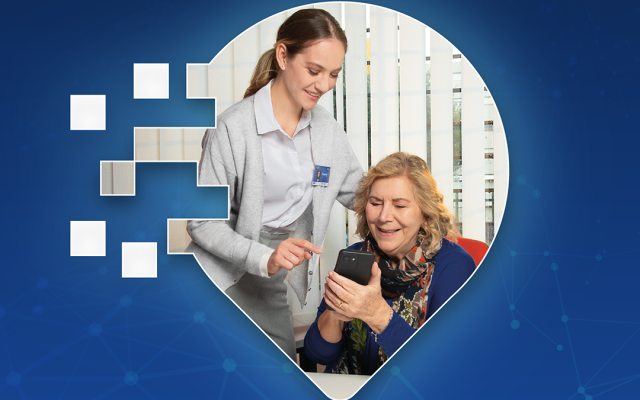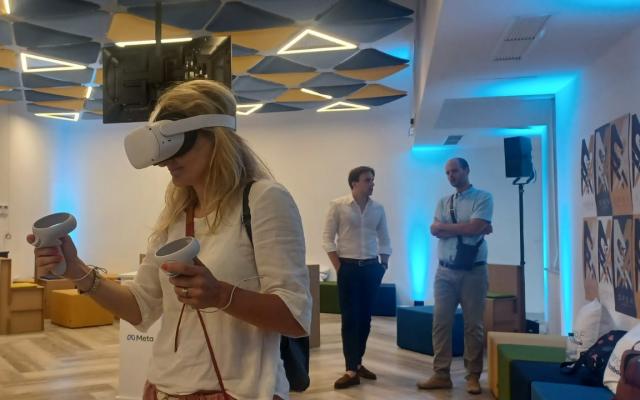Appointment at Binario F with ABI Lab, Engineering, and Meta
Last Friday, November 10th, Binario F held another appointment of Vagone FMD. From 01 to 100 in the Metaverse on the Metaverse for Economic Development and the Banking Sector, in collaboration with Engineering, Meta, and ABI Lab. Participants reflected on the opportunities that immersive reality could provide to the banking sector. In fact, this technology presents new opportunities for communications and marketing, for the distribution and supply of traditional services such finance (credit, finance, payments), and for creating a new relationship platform. Here are the opinions of the morning session participants.
Elisa Amorelli, Communications, Social Marketing and Institutional Relations Coordinator, Fondazione Mondo Digitale. The meetings at Binario F addressed opportunities in the Metaverse. Participants tried to understand what the opportunities of immersive reality are in a purely experiential context. This technology is not a substitute, but a supplement to what one does every day.
Claudia Trivilino, Public Policy Manager Italy and Greece, Meta. The aim of these meetings is to raise awareness and accessibility on the topic of the Metaverse and digital skills in general, discussing these topics with different stakeholders. Binario F is a space for discussion and dialogue.
Romano Stasi, General Secretary, ABI Lab. This is an evolving and interesting topic. We definitely need to study it and conduct research to understand its possibilities. In our opinion, remote contact and customer management is important. Banks already do this with various tools, and the Metaverse will probably be one of these in the future. When we refer to the Metaverse we are speaking about virtual worlds that recreate real persistent worlds in which users can move and interact. It is clear that in our specific sector there are considerations to be made in the areas of identity, governance, and accessibility. We are talking about technologies that are becoming more and more concrete. We have counted ca. 80 applications that are being developed and are already used in banks.
Flavio Fintschj, Fintech Innovation Coordinator, ABI Lab. So what are the opportunities for consumers and organisations? In this part, we will preview data that will be officially presented in December. At a consumer level, there certainly is the issue of investing in brand membership and making consumers feel part of a community. The issue of immersive experiences involves customers in new experiences. And there is entertainment and the construction of socially useful initiatives. At an organizational level, however, we concentrate on customer engagement, brand identity, digital marketing and training and upskilling. Some preview numbers: 77% of consumers show a great level of interest in immersive technologies and believe that these will change interactions between people, brands, and services. The main areas of interest also include interaction with friends, family, and work colleagues.
Francesco Iacarella, Project Manager, Digital Solutions, Engineering. The metaverse must not only reproduce reality, but also enrich it, making it more accessible. When we talk about a Metaverse we are talking about a shared, interoperable, virtual, persistent experience (i.e. the environment has a history and maintains it). The areas in which companies work today are gaming, media, retail and commerce, health, education, co-design, and the industrial world.
Filippo Chiricozzi, Stream Manager – web3 & digital assets | Innovation Banca Sella. Today, we are in the web 3.0, where one can read, write, own assets, and there is an information verification system using blockchain technology, a type of distributed database that acts as an accounting book and global clock to manage and organize user balances within the network over time. At the Sella Group, we have taken a first step to enter this world, Metaverse4Finance. The goal is to build a financial future based on the metaverse and decentralization. As a part of this project, we have selected several other projects, investing in start-ups to act as their enablers.
Massimo Montanaro, IT Architect Poste Italiane. We come from a reality which is that of post offices. Over the years we have moved from the electronic postman to digital and technological services and, working in a sector that deals with Open Banking, we have seen that our customers do not appear mature enough to use services that are not linked to physical tools and tellers. We have a reality that varies between the city and small towns. In these cases, the post office also represents a meeting place, especially for elders who are still tied to physical services. I wonder if there is a social study on this topic.
Andrea Fusco, Head of Digital Platforms, ICCREA Banca. I think that the use of technologies such as augmented reality can have great applications, even if in the case of banks, it is still difficult to imagine cases not connected to ancillary aspects. This aspect therefore represents both a challenge and an opportunity, especially for competitiveness.
Claudio Gaggiotti, Group Marketing and Design, Unicredit. At Unicredit, we are studying the metaverse: we have realized that there is a series of complexities to deal with before being able to approach the end customer. It is a technology that can be used to strengthen your brand and bypass the generational barrier.
Jole Rotello, App Owner. The perspective from which I look the Metaverse is oriented towards show business. Therefore, seeing how virtual shops can be created and how they provide a completely different user experience, as similar as possible to reality, to allow purchases remotely in a dynamic and interactive way or to be able to explore places that are difficult to access.




